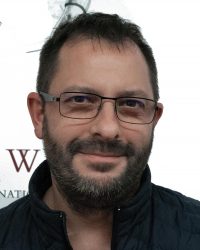


David Modrý (Prof., DVM., Ph.D.) Veterinary parasitologist, since 2011 a full professor of infectious diseases of the Faculty of Veterinary Medicine of UVPS Brno. Currently, he works also as a senior researcher of the Institute of Parasitology of Academy of Sciences of the CR, Dept. of Botany and Zoology of Masaryk University and professor at Dept. of Veterinary Sciences of the Czech University of Life Sciences. Since 2010 works a director of Vétérinaires sans Frontières Czech Republic and member of board of directors of Vétérinaires sans Frontières International.
Main research topics revolve around the transmission of infectious diseases at the livestock-wildlife-humans interface, the One Health paradigm and Conservation Medicine. Recent publications address the tick-borne and other vector-borne infections in wild and domestic carnivores and herbivores, protozoan and helminth parasites of primates and man, emerging parasitoses, parasites of reptiles and other wildlife etc. Ongoing projects involve also citizen participatory approach in tick mapping and large-scale project on parasites of beef cattle and anthelminthic resistance.

Prof. Andrei D. Mihalca, DVM, graduated from the Faculty of Veterinary Medicine in Cluj-Napoca Romania, in 2002 and in 2007 he obtained his Ph.D. degree in Parasitology and Parasitic Diseases at the same institution. Currently he is affiliated to the Department of Parasitology and Parasitic Diseases at the University of Agricultural Sciences and Veterinary Medicine of Cluj-Napoca, Romania. Since 2014, he is Diplomate of the European College of Zoological Medicine. His main research interests include ecology of vectors and vector-borne diseases, wildlife diseases, tropical parasitology and conservation medicine. He published more than 160 papers in international peer-reviewed journals. He is currently the Chair for Guidelines at the Tropical Council for Companion Animal Parasites, an external consultant for EFSA, ECDC, CITES, WWF and IAEA and member of the Scientific Committee of ECZM. He coordinated more than 20 research projects, including the European EurNegVec COST Action. He is actively involved in research, conservation medicine and social veterinary medicine projects focused on parasitic and infectious diseases of small animals (dogs and cats) and wildlife across sub-Saharan Africa with previous work done in Kenya, Uganda, Ivory Coast, Somalia, Central African Republic, Liberia, and Galapagos. Prof. Mihalca is in the editorial board of several peer-reviewed journals, including Parasites & Vectors, International Journal for Parasitology: Parasites and Wildlife, BMC Veterinary Research, Veterinary Parasitology: Regional studies and Reports etc. In the free time, he is doing wildlife photography and travels.

Dr. Baneth is a professor of Veterinary Parasitology and Infectious Diseases at the Hebrew University of Jerusalem in Israel. Dr. Baneth graduated from the Hebrew University Koret School of Veterinary Medicine in Israel in 1990. He did a Small Animal internship and residency at the Hebrew University until 1994 followed by a fellowship in Internal Medicine and Infectious Diseases Research at the College of Veterinary Medicine, North Carolina State University during 1994 and 1995. He received a PhD in veterinary parasitology from the Hebrew University in 2000. Prof. Baneth served as the head of the Small Animal Internal Medicine Department at the Hebrew University Veterinary Teaching Hospital. He is a diplomate of the European College of Veterinary Clinical Pathology (ECVCP), an associate member of the European Veterinary Parasitology College (EVPC) and an editorial advisory board member for the Journal Veterinary Parasitology since 2006. He is the vice president of the LeishVet group for standardization of the diagnosis, treatment and prevention of canine leishmaniasis, a member of Board of Directors, Israel Society for Parasitology, Protozoology and Tropical Diseases, and a founding member of the Tropical Council for Companion Animal Parasites (TroCCAP). Dr. Baneth was the chairman of the World Small Animal Veterinary Association (WSAVA) Scientific Advisory Committee (SAC) during 2014-2019 and was an advisor to the European Food Safety Authority (EFSA) on leishmaniosis. He is currently the director of the School of Veterinary Medicine at the Hebrew University in Israel.
Dr. Baneth heads a laboratory on infectious diseases and One Health. His research interests focus on the pathogenesis, diagnosis and treatment of veterinary and zoonotic vector-borne infectious diseases including leishmaniosis, relapsing fever borreliosis, canine ehrlichiosis, babesiosis, hepatozoonosis, trypanosomiasis and dirofilariasis. Dr. Baneth is involved in the study of zoonotic and veterinary diseases in the Mediterranean Basin, Uzbekistan, Ethiopia, Southern Europe and South America. He is the author of more than 300 scientific publications and book chapters.


Timothy Geary obtained a BSc in Biology from the University of Notre Dame in 1975 and a PhD in Pharmacology in 1980 from the University of Michigan. After working on malaria at Michigan State University as a Postdoctoral Fellow and Research Assistant Professor, he joined the parasitology research group at The Upjohn Company (Pharmacia – Pfizer) in 1985. In 2005, he joined the Institute of Parasitology at McGill University as Professor and Tier I Canada Research Chair. He served as Director of the Institute from 2007-2019, when he became Emeritus Professor. He is also a Professor (20 % appointment) in the School of Biological Sciences at Queen’s University – Belfast.
Tim earned national and international funding to support his research and received many awards. He published > 230 peer-reviewed articles and book chapters, is on the editorial boards of 7 scientific journals and is as a consultant for many pharmaceutical, government and non-government organizations. He is a Past-President of the American Association of Veterinary Parasitologists and is a member of the Executive Committee of the World Association for the Advancement of Veterinary Parasitology and the Advisory Boards of the National Center for Veterinary Parasitology (USA) and the NIH-NIAID Filariasis Research Reagent Resource Center.
Tim works on chemotherapy of parasitic diseases; pharmacology of antiparasitic drugs; mechanisms of antiparasitic drug resistance; antiparasitic drug discovery and development; and the molecular language of the host-parasite interface.

Dr Filipe Dantas-Torres is a Full Researcher and a Professor of Science Writing at the Aggeu Magalhães Research Institute (Fiocruz-PE, Brazil). He is a veterinarian (MV) with a Master of Sciences (MSc) and a Doctor of Sciences (DSc) from the Aggeu Magalhães Research Institute. He also holds a Dottorato di Ricerca (PhD) from University of Bari, Italy. In 2010, he was elected Fellow of the Royal Entomological Society (FRES) and nominated Expert in Parasitology and Parasitic Diseases by the University of Bari. In 2013, he received the tittle of Diplomate of the European College of Veterinary Parasitology (Dipl. EVPC) and the Peter Nansen Young Scientist Award 2013 from the World Association for the Advancement of Veterinary Parasitology (WAAVP). Dr. Dantas-Torres is the author or co-author of over 300 publications, including over 200 articles in refereed journals and 11 book chapters. He is a Subject Editor of Parasites & Vectors and an Associate Editor of Medical and Veterinary Entomology. He is is a member of the Companion Animal Vector Borne Diseases (CVBD) World Forum (http://www.cvbd.org/) and of Brasileish, a working group of leading experts on canine leishmaniasis in Brazil. His research interests are in vector-borne diseases, including leishmaniasis, dirofilariosis and tick-borne diseases.

Professor Sreekumar Chirukandoth completed his B.V.Sc., from the Madras Veterinary College in 1989. He got his masters in Parasitology in 1992 from the same college. Joined the Tamil Nadu Veterinary and Animal Sciences University (TANUVAS) as an Assistant Professor in 1994. He obtained his doctoral degree in Veterinary Parasitology from the Indian Veterinary Research Institute, Izatnagar, in 2001. His thesis was awarded the Jawaharlal Nehru Award for the best Ph.D. thesis by the Indian Council of Agricultural Research. He served as a visiting scientist in the laboratory of renowned parasitologist Dr.J.P.Dubey at the Animal Parasitology Unit of the United States Department of Agriculture, Beltsville, Maryland, from 2001 to 2004 and worked on apicomplexans, after which he continued to work for TANUVAS. He specializes in molecular parasitology with emphasis on its application towards diagnosis and genotyping of parasitic diseases. He is a self-taught herpetologist and specializes in the conservation of venomous snakes. He has active interest in wildlife rehabilitaiton and was a member of the Emergency Relief Network of the Wildlife Trust of India.

Patricia Conrad DVM, PhD is a distinguished Professor Emerita in the School of Veterinary Medicine, University of California, Davis. Her research has focused on the transmission of protozoal parasites between wildlife, humans and domestic animals. She received her veterinary professional degree from Colorado State University and PhD from the University of Edinburgh, Scotland. After doing post-doctoral research on the molecular epidemiology of East Coast fever at the International Laboratory for Research on Animal Diseases (now ILRI) in Nairobi, Kenya, she joined the faculty of the School of Veterinary Medicine at the University of California, Davis. Dr. Conrad has published over 235 scientific papers (61 h-index) and book chapters in the fields of emerging infectious diseases, parasitology, ecology of waterborne pathogens and One Health. Dr. Conrad was elected to the National Academy of Medicine in 2011, awarded a Fellowship in the American Academy of Microbiology in 2012 and selected as an American Association of the Advancement of Science Fellow in 2018. In 2017 she received the American Veterinary Medical Association Lifetime Excellence in Research Award for her research and contributions to the veterinary profession; taking a One Health approach that addresses the interconnectedness of animals, plants, people and the environment. In 2018 she was awarded the UC Davis Chancellor’s Award for International Engagement and in 2019 received the Lifetime Achievement Award for Babesiosis Research.

Jan Šlapeta, Professor of Veterinary and Molecular Parasitology, Sydney School of Veterinary Science. He is parasitologist who has mastered biology, identity, diversity and other unexpected traits of parasites of both medical and veterinary importance, as well as the free-living counterparts. He was educated in the Czech Republic. He completed 3 postdocs – NIH in New York, CNRS in Paris, and at UTS in Sydney before accepting an academic position at the University of Sydney in 2007. He combines state-of-the-art molecular applications with a deep historical knowledge of parasitology, to redefine existing parasitic species, to describe new parasitic species, and to understand their origin. To achieve understanding of host–parasite relationships he focuses on recognizing a role of parasites on host through their role within the microbiome community of a host or a vector. As a teacher and educator, Jan engaging students with contemporary examples of veterinary and public health situations to instill that critical thinking so necessary after graduation. Students say that Jan tends to ask ‘tricky’ questions. It is all to motivate students for self-directed study, to cope and learn from mistakes in a controlled environment. He is currently the Deputy Editor for the International Journal for Parasitology.

Jozef Vercruysse graduated in 1974 as Doctor in Veterinary Medicine at the Ghent University, Belgium. Between 1975 and 1983 he worked as a parasitologist in Africa and between 1984 and 2016 he was Professor of Parasitology at the Veterinary Faculty of Ghent University, Belgium. Currently he is Em. Prof at UGent. His research topics were the diagnosis, epidemiology, treatment and control of helminth infections of both livestock and humans (tropics). For more than 30 years he coordinated antiparasitic drug’s efficacy studies of livestock with the Pharmaceutical Industry. He was promoter and coordinator of approx. 50 projects on human and animal parasitic diseases in Belgium, EU countries and the tropics. The job has taken him into the field in many countries worldwide, working on far-flung projects and managing teams of researchers in the quest for important and interesting scientific breakthroughs in the field of parasitology. He is (co)author of approximately 600 articles in international scientific journals with peer review (H-index 53). He supervised 32 PhD students. He was chairman of VICH and WAAVP anthelmintic guidelines group and he was the coordinator of the EU projects “PARASOL” (2006 – 2009) and “GLOWORM” (2011 – 2014). He organised the 21st WAAVP meeting in Ghent (2007), Belgium.

Prof. Una Ryan is a Professor in Biochemistry at Murdoch University (MU) in Western Australia. She obtained her undergraduate degree in Zoology in 1988 from University College Dublin, Ireland and her PhD in 1996 in Parasitology from MU. Prof. Ryan is an internationally recognized expert on protozoan systematics and molecular epidemiology, particularly Cryptosporidium and Giardia.
She has >320 publications and a h-index of 59. In 2000, she was awarded the Australian Federal Minister’s Prize for Achievement in Life Sciences and in 2014 was awarded the Bancroft-Mackerras Medal from the Australian Society for Parasitology for excellence in research. She is currently co-Editor in Chief of Parasitology Research.

Manigandan Lejeune Virapin Ph.D., Dip ACVM ,diplomate of the American college of Veterinary Microbiologists specializing in Parasitology, Mani did his doctorate from the University of Calgary, Canada. Experienced in studying host parasite interaction that involve disciplines such as pathology, immunology, molecular biology and gastroenterology. His interest in the field of diagnostic parasitology made him to get involved in developing diagnostics for Veterinary Parasites and pathogens as well as in studying the biodiversity of parasites of North American wild life. Manigandan is presently the Director of Clinical Parasitology: senior extension associate at the Animal health diagnostic centre, New York state Veterinary Diagnostic laboratory of the College of Veterinary Medicine, Cornell University, Ithaca. He has to credit 9 research grants funds for projects related to Parasitology as Principal Investigator and Co Principal Investigator. Published research articles in reputed journals related to the field of parasitology. He is also the co-founder – Veterinary Parasitology Diagnostic Network (VetPDx).

Prof. Edwin Claerebout graduated as a veterinarian from Ghent University, Belgium in 1990. After a short stay in a rural veterinary practice in Northern Ireland, he started working at the Laboratory of Parasitology, Ghent University, where he obtained his PhD in veterinary sciences (parasitology). He is currently an EBVS® European Veterinary Specialist in Parasitology (dipEVPC) and professor in parasitology at the Faculty of Veterinary Medicine of Ghent University, where he lectures on parasitic diseases in domestic animals. His research interests are parasitic diseases in livestock, in particular sustainable control of gastro-intestinal parasites and psoroptic mange in cattle. This includes vaccine development against gastrointestinal nematodes, antiparasitic drug resistance, decision support tools for parasite control, and research into barriers and incentives for uptake of sustainable parasite control by farmers and veterinarians.
